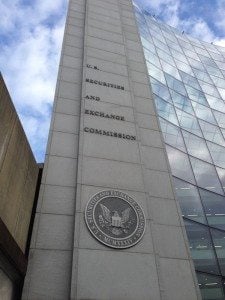
As a growing number of nations around the globe embrace the potential of Fintech to provide superior services to consumers, businesses and the under-banked, one country stands out as lacking in leadership in the evolution of finance.
The US has been the epicenter of financial services and markets for many decades. New York City is a global hub of banking, markets, and affiliated services. Depending on how you measure things, both London and New York have topped the list of financial center rankings (Singapore is in the mix too). But while New York is a global hub for traditional finance when it comes to Fintech innovation usually London and Singapore first come to mind.
 This is not to say there are not a growing number of Fintech firms setting up shop in the Big Apple but more a comment on public policy. While both Singapore and the UK have seen firm governmental support in developing a Fintech ecosystem – the same cannot be said about the US of A.
This is not to say there are not a growing number of Fintech firms setting up shop in the Big Apple but more a comment on public policy. While both Singapore and the UK have seen firm governmental support in developing a Fintech ecosystem – the same cannot be said about the US of A.
Sure. US policy makers are slowly coming around. But too many hurdles remain.
The Financial Conduct Authority (FCA) in the UK created the concept of a Fintech Sandbox to allow disruptive financial firms to test their models without being hindered by ill-suited regulations. The FCA is accepting applications for its 2nd round of participants now. Simultaneously the Bank of England has launched its own Fintech Accelerator.
The Monetary Authority of Singapore (MAS) announced guidelines for their Fintech Sandbox last week. The public consultation on the Sandbox started in June 2016, finished in July and is now ready to push forward. Singapore has launched the largest Fintech Accelerator in the world with the backing of the government. In the US there has been ongoing discussion, but little real movement from the public sector acknowledging the importance for our financial industry.
 SEC Commissioner Piwowar, to his credit, stated at the recent Fintech Forum organized by the SEC (it was Piwowar’s idea), stated in his opening remarks;
SEC Commissioner Piwowar, to his credit, stated at the recent Fintech Forum organized by the SEC (it was Piwowar’s idea), stated in his opening remarks;
“As is obvious to any market participant or observer, our financial regulatory structure is a fragmented, sometimes contradictory, alphabet soup. A recent study by Georgetown University’s McDonough School of Business Center for Financial Markets Policy correctly points out that the most common regulatory struggle for FinTech firms in the United States “does not concern a specific regulation or regulator, but rather the extremely complex process of navigating multiple regulatory portals.” The great potential of FinTech should not be hindered by our current regulatory structure.”
Piwowar believes the SEC should take the lead regulatory role in the emerging Fintech sector and he has a strong argument.
The Commission is a bipartisan group, beholden to Congress, with offices spread across the country that can uniquely provide local support for emerging innovative financial firms. The SEC is perhaps best poised in the incredibly encumbered financial regulatory world to provide blocking power for entrepreneurs hoping to provide better services to the US population while benefitting the economy.
Will the incoming administration see the potential of Fintech that is so obvious to the rest of the world? Let’s hope this is the case.
Commissioner Piwowar’s opening statement at the Fintech Forum is republished below.
Nov. 14, 2016
Good morning. Welcome to all of you, especially the distinguished panelists. I want to thank Chair White for holding today’s forum, as well as being forward-thinking about financial technology (“FinTech”) by creating the Commission’s first ever FinTech working group. In her opening remarks, Chair White already mentioned a number of staffers who helped make this forum happen. I also want to recognize Michael Liftik and Ryan VanGrack from the Chair’s Office for all their efforts in coordinating this event.
I am delighted that the Commission has convened this forum to discuss FinTech and, specifically, FinTech’s potential benefits to investors and our markets, the risks that FinTech may create, and the role of the Commission in fostering further FinTech innovations while staying true to our mission of protecting investors, maintaining fair, orderly, and efficient markets, and facilitating capital formation.
FinTech is frequently lauded as a disruptive force that is transforming the financial services industry, and that is clearly true. On a recent trip to East Africa, I saw firsthand the transformational impact of FinTech. In a region where a significant portion of the population does not have access to the creature comforts we take for granted in the United States — let alone bank accounts — the pervasive M-Pesa technology facilitates payment for services and money transfers on early generation cellular telephones. Financial inclusion rates have grown dramatically and crime rates have dropped substantially since the introduction of that technology.
But I hope that today’s discussion will go further than simply celebrating the successes, momentum and future promise of FinTech. I encourage the panelists to tackle the difficult regulatory questions that FinTech presents. We should also explore various constructs that have been proposed, both domestically and internationally, to encourage FinTech innovations without creating undue risks to the marketplace or imposing artificial limits on activities (e.g., regulatory sandboxes).
As is obvious to any market participant or observer, our financial regulatory structure is a fragmented, sometimes contradictory, alphabet soup. A recent study by Georgetown University’s McDonough School of Business Center for Financial Markets Policy correctly points out that the most common regulatory struggle for FinTech firms in the United States “does not concern a specific regulation or regulator, but rather the extremely complex process of navigating multiple regulatory portals.” The great potential of FinTech should not be hindered by our current regulatory structure.
Therefore, I believe the Commission should take the lead regulatory role in the FinTech space. Many of the firms pursuing FinTech are already SEC registrants, and others are providing services that are squarely within the Commission’s oversight, such as investment advice and trading and settlement functionalities. And we are the only agency with a mission that explicitly includes facilitating capital formation. In that regard, our recent crowdfunding initiatives provide us the relevant experience and expertise for understanding the regulatory challenges of small and medium-sized enterprises (“SMEs”) and their investors. Finally, the Commission has 11 regional offices, several in areas that are centers of FinTech innovation, that could serve as intake centers for FinTech startups seeking regulatory information and guidance.
All that is to say that the SEC is uniquely situated to determine whether and how FinTech currently fits, and ultimately should fit, within a financial regulatory structure. Today’s forum is an important first step in that journey.
Thank you.

